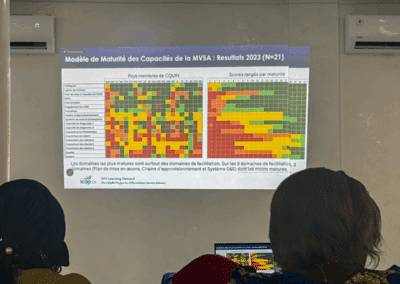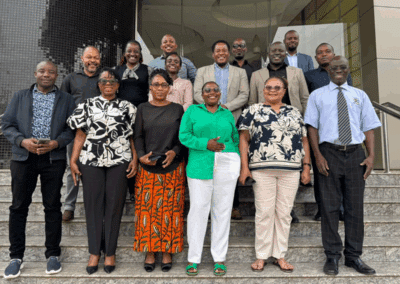Tatenda Makoni, executive director of the Zimbabwe National Network for people living with HIV (ZNNP+), an umbrella organization for recipients of care in Zimbabwe, efficiently uses his space in the sector to influence health and HIV policy outcomes. Mr. Makoni has had a successful career with several organizations including the UN in Eswatini and Nigeria. He holds a Master of Science Degree in International Relations, a Master of Science Degree in Strategic Management, a bachelor’s degree in Political Science, and a Bachelor of Laws Degree (LLB). Mr. Makoni is a member of the Zimbabwe Law Society and sits on the Institutional Review Board of the Biomedical Research and Training Institute (BRTI-IRB), and on the AIDS and Rights Alliance for Southern Africa, ARASA, Board of Trustees.
Mr. Makoni attended the April 26-29 CQUIN Delivering Quality at Scale in Differentiated Service Delivery Programs workshop in South Africa, where he moderated a breakout session on client satisfaction and the use of client feedback to improve differentiated service delivery (DSD) programs for recipients of care.
He shares his perspectives on quality differentiated service delivery in this Q&A.
Why is quality an essential aspect of DSD?
Quality HIV services span clinical and health systems and other service delivery components and settings across a cascade of HIV prevention, care, and treatment services, including maternal, newborn, and child health. High-quality HIV clinical services should provide people-centered care that is focused and organized around the health needs, preferences, and expectations of people and communities. High-quality HIV services should uphold individual dignity and respect, especially for vulnerable populations, and engage and support people and families to actively participate in their care through informed decision-making. High-quality HIV services should also offer safe, acceptable, and appropriate clinical and non-clinical services in a timely fashion, aiming to reduce morbidity and mortality associated with HIV infection, improve health outcomes and quality of life in general, and promote efficient and effective use of resources.
What do you think is the overall quality of differentiated service delivery in Zimbabwe?
The quality of DSD in Zimbabwe varies from facility to facility. It is affected by many factors such as the availability of human resources for health, availability of services, time spent at a health facility, services and how they are accessed, stigma, the environment around the health facility, and the affordability of these services.
The quality of DSD services in Zimbabwe is average because the above factors are critical in ensuring a high uptake of the available models. In addition, these models must also address recipients of care issues.
How can health facilities implement meaningful quality services for recipients of care?
For quality to be meaningful to recipients of care, it is imperative to involve them in the quality management cycle in terms of defining what composes quality, whether the quality standards are being met, and assessing areas in which quality can be improved. Quality affects uptake, satisfaction levels, treatment outcomes, demand for services, and the relationship between the community and the health facility. Therefore, quality DSD services should smoothly and effectively address recipient of care needs. Some models like the outreach model in Zimbabwe became very popular during the COVID-19 pandemic as facilities moved services to the community to reduce facility visits. Discussions I’ve had with beneficiaries of the model indicated that they were so happy with the quality of the services. Some considerations for what constitutes quality in DSD models from the recipients of care’s perspective have been issues of privacy, confidentiality, respect, non-judgementalism, self-determination, and flexibility.
In conclusion, there is a need to systematically track the quality of DSD models from the recipients of care who are enrolled in various models. It is also important to track the movement of people from one model to the other. There is a need to have a holistic approach to DSD delivery. We appreciate the Zimbabwe Ministry of Health and Child Care’s efforts to ensure that recipients of care have quality services to enhance treatment outcomes, which is the goal of ART interventions.






